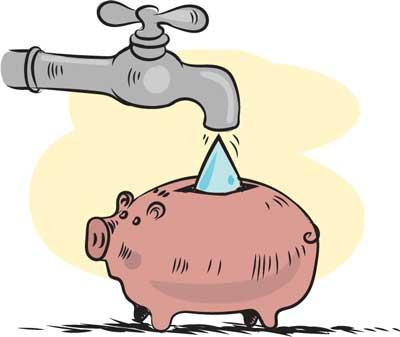09 Mar 2023 - {{hitsCtrl.values.hits}}
Freely what we receive, we often tend to misuse or waste. This is the case with water, which is essential for life. We have heard the saying that little drops of water make the mighty ocean. Experts have found out that just as the superpowers like the United States have gone to war for oil, in the coming decades they may go to war to gain control of fresh water resources.
 Sri Lanka as a paradise isle is surrounded by water. We have been blessed with 12 major rivers—the Mahaweli, the Malvathu river, Kelani River, Yan Oya, Deduru Oya, Maduru Oya, Maha Oya, Kalu Ganga River, Gin Ganga, Kumbukkan Oya, Attanagalu Oya and Nilwala River. In addition we have many fresh water canals and water ways. At one time, the world soft-drink giant made a huge investment in Sri Lanka not so much for our country’s benefit, but to make a huge profit because water was freely available. The company made its popular soft drink here and sold it worldwide.
Sri Lanka as a paradise isle is surrounded by water. We have been blessed with 12 major rivers—the Mahaweli, the Malvathu river, Kelani River, Yan Oya, Deduru Oya, Maduru Oya, Maha Oya, Kalu Ganga River, Gin Ganga, Kumbukkan Oya, Attanagalu Oya and Nilwala River. In addition we have many fresh water canals and water ways. At one time, the world soft-drink giant made a huge investment in Sri Lanka not so much for our country’s benefit, but to make a huge profit because water was freely available. The company made its popular soft drink here and sold it worldwide.
Climate change experts warn that the world may soon face a water crisis. So as responsible citizens, it is our duty to save fresh water. When we wash our hands or utensils, we need to open the taps only halfway, so that we could save a few litres of water. If a million people do this, it would mean saving millions of litres of water and it could be like a river. In addition, when we wash rice, vegetables and other items before cooking, we need to save the water used for such purposes to water trees and plants in our home gardens. In addition, if we cut down our shower bath time by five minutes a day, we could save gallons of water a month. We need to learn to think in such a responsible and creative way. For instance, some good citizens use equipment to divert the shower bath water to the cisterns in our toilets and washrooms. We also need to stop using fresh water to wash vehicles and find alternatives such as well water while some people also use water from tube wells for various purposes so that the fresh water supply system could be maintained for a longer period.
On March 22, the United Nations marks ‘World Water Day’ with the focus on accelerating change to solve the water and sanitation crisis. Dysfunction throughout the water cycle undermines progress on major global issues, from health to hunger, gender equality to jobs, education to industry, and disasters to peace. In 2015, the world committed to Sustainable Development Goal (SDG) 6 as part of the 2030 Agenda – the promise that everyone would have safely managed water and sanitation by 2030. Right now, we are seriously off-track.
Billions of people and countless schools, businesses, healthcare centers, farms, and factories are being held back because their human rights to water and sanitation still need to be fulfilled. There is an urgent need to accelerate change – to go beyond ‘business as usual.’ The latest data show that governments must work on average four times faster to meet SDG 6 on time, but this is not a situation that any single actor or group can solve. Water affects everyone, so we need everyone to take action.
The UN says undoubtedly, 2023 is a particular year for commitments regarding the use of water and its sanitation. The celebration of this World Water Day coincides with the start of the UN 2023 Water Conference to be held from March 22 to 24 in New York. The conference is a once-in-a-generation opportunity to unite the world around solving the water and sanitation crisis. National governments and stakeholders from all levels of society will collaborate to make voluntary commitments to accelerating progress on SDG 6 and other internationally-agreed water-related goals and targets. These voluntary commitments will form the Water Action Agenda, designed to deliver rapid, transformative change in the remainder of this decade.
According to the UN, 1.4 million people die annually and 74 million will have their lives shortened by diseases related to poor water, sanitation and hygiene. Today, 1 in 4 people – 2 billion people worldwide – lack safe drinking water. Almost half of the global population – 3.6 billion people – lack safe sanitation. Globally, 44% of household wastewater is not safely treated. Global water demand (in water withdrawals) is projected to increase by 55% by 2050.
Indian spiritual guru and proponent Vedanta Swami Sivananda says, a mountain is composed of tiny grains of earth. The ocean is made up of tiny drops of water. Even so, life is but, an endless series of little details, actions, speeches, and thoughts. And the consequences whether good or bad of even the least of them are far-reaching.
08 Jan 2025 16 minute ago
07 Jan 2025 7 hours ago
07 Jan 2025 7 hours ago
07 Jan 2025 8 hours ago
07 Jan 2025 07 Jan 2025